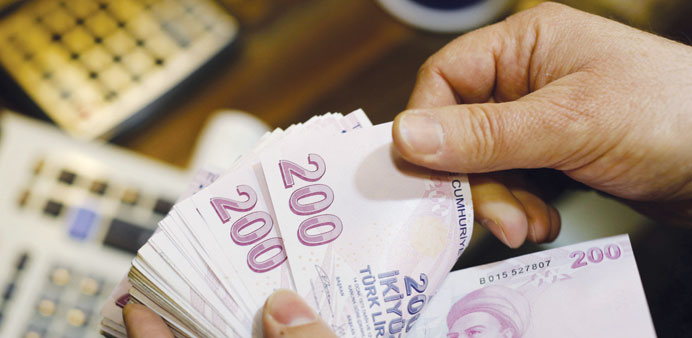A money changer counts Turkish lira bills at an exchange house in Istanbul. Investors are withdrawing as Turkey’s bombardment of Islamic State fighters in Syria and Kurdish militants in Iraq threatens to further undermine economic growth that will probably miss the official 4% target.
Bloomberg/Istanbul
Turkish offensives in Syria and Iraq are destroying the best currency trade in emerging markets.
The lira plunged to its weakest level on a closing basis on Monday as investors abandoned borrowing in dollars to buy liras, a so-called carry trade that had earned the highest returns among its peers since May. The country’s borrowing costs jumped, with 10-year government bond yields breaching 10% for the first time since September.
Investors are withdrawing as Turkey’s bombardment of Islamic State fighters in Syria and Kurdish militants in Iraq threatens to further undermine economic growth that will probably miss the official 4% target, while complicating negotiations to form a government after inconclusive June 7 elections. For some strategists, it’s time to take off wagers on lira strength, known as long bets.
“Intensifying noise in the Syrian border is making coalition talks more difficult,” said Luis Costa, a London-based strategist at Citigroup Inc, who recommended selling the lira as the week’s “new trade idea” on Monday. “Real money and leveraged investors started to close out many of the lira longs established in previous weeks. This process is not over yet.”
Finance Minister Mehmet Simsek said that while the economy was expected to slow in the first half of 2015, unforeseen conflict and the prospect of repeat elections could force the government to cut its macro forecasts. Turkey’s nearly $800bn economy will probably grow 3% this year, according to the average of 27 economist estimates on Bloomberg.
“Uncertainty from the elections hasn’t been lifted,” Simsek said in an interview on NTV television on Monday. While the cross-border military operations could weigh on markets, “we can’t allow terrorist groups to carry out operations on Turkey,” he said.
Turkish jets have struck the Kurdish PKK rebel group in northern Iraq and Islamic State fighters in Syria in waves of attacks since July 24. The operations started after a bombing linked to Islamic State killed 32 people in southeast Turkey, triggering reprisals by Kurdish rebels.
Even before the latest bout of violence, foreign investors had sold about $3.7bn in Turkish stocks and bonds as of July 17, the most on record, according to the latest central bank data.
“The worsening situation comes at a time when Turkish politicians are still undergoing drawn negotiations to form a government, and the odds of early elections appear to be rising,” Roxana Hulea, a London-based Societe Generale SA strategist, said by e-mail on Monday. “Recent events signal the potential for further underperformance of the currency and weakness in lira rates.”
The yield on Turkey’s 10-year debt fell to 9.83% on Tuesday after rising to 10.04% on Monday. The lira plunged as much as 1.4% to 2.7768 per dollar, leaving it about 1% away from its all-time intraday low on June 8.
Losses on the lira carry trade, in which investors borrow money in countries with low interest rates to earn higher rates on investments in Turkey, were 11% for 2015 as of yesterday, data compiled by Bloomberg show. From May 1 until the July 20 bombing, the trade earned the most worldwide.
One of the major drivers for the outperformance was a collapse in energy prices, which benefits Turkey because the country imports almost all of its oil. The effect is partly diminished by a negative impact on trade and investment partners in the Middle East and Russia, Simsek said.
“Positioning changed from ‘hell’ to ’heaven’ way too fast over the last month, purely on the back of oil prices,” Citi’s Costa said. “Investors ignored the fact that the downtrend in commodities is now being read as a negative for global emerging- market risk.”

